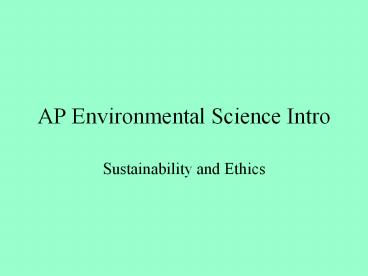AP Environmental Science Intro - PowerPoint PPT Presentation
Title:
AP Environmental Science Intro
Description:
AP Environmental Science Intro Sustainability and Ethics Tragedy of the Commons Degradation of the renewable resources Reasoned by If I don t use this resource ... – PowerPoint PPT presentation
Number of Views:81
Avg rating:3.0/5.0
Title: AP Environmental Science Intro
1
AP Environmental Science Intro
- Sustainability and Ethics
2
Introduction
- Environment
- External conditions that affect living organisms
- Ecology
- Study of relationships between living organisms
and their environment - Environmental Science
- how nature works.
- how the environment effects us.
- how we effect the environment.
- how we can live more sustainably without
degrading our life-support system.
3
(No Transcript)
4
Tragedy of the Commons
- Degradation of the renewable resources
- Reasoned by If I dont use this resource,
someone else will. - Problem too many people resource get depleted
and no one benefits.
5
Environmental Ethics Worldviews
- Planetary management- separate from nature
- Stewardship worldview- earth for our benefit but
we have ethical responsibility to be caring
sewards - Environmental Wisdom- our success depends
sustainable practices
6
(No Transcript)
7
Earth-Wisdom Worldview
- Nature exists for all of the earths species, not
just for us - There is not always more
- Not all forms of economic growth is beneficial to
the environment - Our success depends on learning to cooperate with
one another and with the earth
8
Planetary Management Worldview
- There is always more
- All economic growth is good
- Potential for economic growth is limitless
- Our success depends on how well we manage earths
system for our benefit
9
Sustainability The Integrative Theme
- Sustainability, is the ability of earths various
systems to survive and adapt to environmental
conditions indefinitely. - The steps to sustainability must be supported by
sound science.
Figure 1-3
10
Four Scientific Principles of Sustainability
Copy Nature
- Reliance on Solar Energy
- Biodiversity
- Population Control
- Nutrient Recycling
Figure 1-16
11
EARTH
Sun
Economic Systems
Heat
Depletion of nonrenewable resources
Production
Natural Capital
Air, water, land, soil, biodiversity, minerals,
raw materials, energy resources dilution,
decomposition, recycling services
Degradation depletion of renewable resources
used faster than replenished
Consumption
Pollution, waste from overloading natures waste
disposal recycling systems
Recycling and reuse
Fig. 24-4, p. 573
12
Pollution
- Any addition to air, water, soil, or food that
threatens the health, survival, or activities of
humans or other living organisms - Solid, liquid, or gaseous by-products or wastes
13
Nonpoint Source Pollutants
- Dispersed and often difficult to identify sources
- Runoff of fertilizers and pesticides
- Storm Drains (1 source of oil spills in oceans)
14
Point Source Pollutants
- From a single, identifiable sources
- Smokestack of a power plant
- Drainpipe of a meat-packing plant
- Exhaust pipe of an automobile
15
Negativity of Pollutant
- Chemical Nature
- How active and harmful it is to living organisms
- Concentration
- Amount per unit volume or weight of air, water,
soil or body weight - Persistence
- Time it stays in the air, water, soil or body
16
Water Pollution
- Sediment
- Nutrient overload
- Toxic chemicals
- Infectious agents
- Oxygen depletion
- Pesticides
- Oil spills
- Excess heat
17
Air Pollution
- Global climate change
- Stratospheric ozone depletion
- Urban air pollution
- Acid deposition
- Outdoor pollutants
- Indoor pollutants
- Noise
18
Solutions Pollution Prevention
- Input Pollution Control or Throughput Solution
- Slows or eliminates the production of pollutants,
often by switching to less harmful chemicals or
processes - Four Rs
- Reduce, reuse, refuse, recycle
19
(No Transcript)
20
STUFF
- http//www.storyofstuff.org































